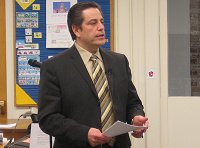- By Dan Veaner
- News
 Print
Print 
Johnson Control's David Angello
In October of 2005 the BOE considered entering into an energy performance contract with Johnson Controls, a global automotive experience, building efficiency, and power solutions consulting company. At that time Johnson Control's David Angello presented a proposal that would mean an up front expenditure on equipment and repairs that would not only pay for itself in energy savings, but also pay for his company's services and still yield a significant savings to the school district over an 18 year period. The deal was that if the BOE didn't actually realize the agreed upon savings or better Angello's company would write them a check for the difference.
At that time Interim Business Administrator Larry Driscoll predicted that the energy saving measures would result in $3.3 million in energy savings over the life of the 18 year contract. The district would have to pay the debt on loans for the equipment and the fees to the company they hire to install the improvements. After expenses Driscoll said the school district would save nearly $2 million. This would entail a 33% reduction in utilities which would result in environmental as well as cash savings. At the time the project was tied to the capital project, and when that failed the idea faded away.
But with increasing deterioration to school buildings and no capital project in sight, Angello was back in Lansing last week to explain how an energy performance contract could make most of the needed repairs possible without a capital project. "What can we do to improve the learning environments while reducing the school's energy consumption?" Angello asked. "If we can do all that and save money, and in this case actually put money back into the school's budget, that would be a good thing."
Angello and a colleague Andrew Bukaty presented a powerpoint to the board that summarized the proposal they brought three years ago, updated after consulting with current school officials. This time they offered the idea as an alternative to a capital project, pointing out that no voter referendum would be needed with other benefits including getting the work done immediately with guaranteed savings. He noted that 50% of the cost of a building over its life cycle is in operations costs to keep it going for 50 or more years.
The project would include improvements to lighting and lighting controls, installation of a geothermal system, new boilers at the elementary school, and high efficiency electric motors, as well as energy saving devices such as an air curtain at the entrance to the elementary school from the playground. It would include a pool cover and dehumidifier, computer controls, window film to keep heat out in summer and in during the winter, and improvements to the building envelope. It would also mean adjusting the light bulbs to correct lighting levels downward in line with state recommendations.
District Clerk Jodie Rusaw says the next step will be the formation of an Energy Performance Committee that will look at suggestions and work with Johnson Control representatives to make a decision on the scope of the project. When the scope of the project is determined the actual amount of savings over an 18 year period will be determined. At that point the BOE will act on the recommendation of the committee.
Rusaw says the earliest the project could be started would be next fall. But she said that is a best case scenario.
----
v4i5



